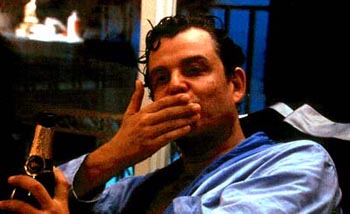![[Metroactive Movies]](/movies/gifs/movies468.gif)
[ Movies Index | Show Times | Silicon Valley | Metroactive Home | Archives ]
 Let's Do Lunch Superagent Ivan Beckman (Danny Huston) enjoys the good life before the fall in 'ivans xtc.' Dime a Decadence Bernard Rose chides Hollywood in 'ivans xtc.' IN THE MAIN-FLOOR GALLERY of the Musée d'Orsay in Paris hangs a monumental canvas by Thomas Couture titled Romans of the Decadence. It's a widescreen painting meant to give Parisians of 1847 an eyeful of Imperial rot. An orgy in full swing is witnessed by two laurel-crowned philosophers who stand in the corner, shocked out of a year's growth by the bare breasts and gorging mouths. You get spectacle and moral lesson in one easy package. Adam Gopnick, in his fine book Paris to the Moon, claimed he wanted to take a straight razor to Couture's painting because it crassly upstages the real treasures of the d'Orsay: the works of Van Gogh, Cezanne and Toulouse-Lautrec exhibited in smaller galleries near the roof. However, we déclassé movie-lovers can appreciate the yawping CinemaScope energy of Romans of the Decadence. It's the painting version of Gladiator. Director Bernard Rose, in his notes for ivans xtc., writes that he was inspired to make his film by the contrast between some vulgar French paintings of Couture's age--"ugly, gaudy canvases"--at the Art Institute of Chicago and the Impressionist works there that he preferred. With the new digital cameras, such as the Sony High Definition Digital Camera with which ivans xtc. was made, we will catch real life on the fly, as opposed to "decadent" movie-studio filmmaking, akin to pre-Impressionist art: those hackneyed "sylphs dancing in fake ancient settings." Guess what Rose captures with his digital camera? Roman decadence. Or rather, its more inexpensive contemporary version: Hollywood decadence. Danny Huston stars as Ivan Beckman, a cynical, wenching, high-powered agent whose sudden demise leaves no one mourning. After his funeral, we see his story in flashback: how Beckman was reduced to human stature by a diagnosis of terminal cancer. We also see how he was unable to tell anyone of his secret suffering: neither his fond mistress (Lisa Enos, the film's co-writer, producer and spouse to director Rose), nor his father, an artist. (By the way, the father is played by Robert Graham, Danny Huston's brother-in-law, the very man responsible for San Jose's uproarious Quetzalcoatl statue.) You can understand Rose's desire to get revenge for his jinxed career. Rose's story is that his career was sabotaged when his 1997 adaptation of Anna Karenina was butchered by the studio. Having seen it, I don't recall that jumpiness was its primary problem; a stiff lead actress and extremely awkward dialogue are more likely explanations for why the film sank. Once again, Rose is tackling Tolstoy. The short story "The Death of Ivan Ilyich" is the source here, telling how even a bad man can be redeemed by the transcendent moment of death. The source might as well be Judith Krantz. The fact is that all of us will have to die, probably without the consolation of the orgies available to a Hollywood player. Since all most of us can do is watch this decadence and imagine, it's not too much to ask for well-photographed decadence. Instead, Rose teases us with underexposed glimpses and then shakes a scythe at us.
ivans xtc. (Unrated; 92 min.), directed by Bernard Rose, written by Rose and Lisa Enos, based on 'The Death of Ivan Ilyich' by Leo Tolstoy, photographed by Rose and Ron Forsythe and starring Danny Huston, Peter Weller and Lisa Enos, opens Friday at the Towne Theater in San Jose.
Send a letter to the editor about this story via email . [ Silicon Valley | Metroactive Home | Archives ]
|
From the August 15-21, 2002 issue of Metro, Silicon Valley's Weekly Newspaper.
Copyright © Metro Publishing Inc. Metroactive is affiliated with the Boulevards Network.
For more information about the San Jose/Silicon Valley area, visit sanjose.com.